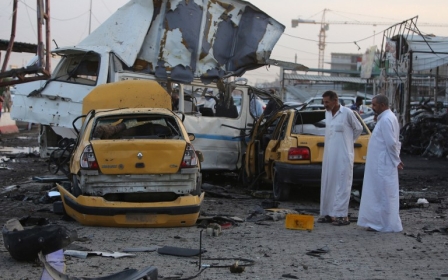Iraq MPs approve defence, interior ministers

Iraqi lawmakers approved new defence and interior ministers on Saturday completing a unity government after weeks of delay.
Mohammed Salem al-Ghabban, a Shiite, was appointed interior minister, while Khaled al-Obeidi, a Sunni, was confirmed as defence minister, as security forces battle Islamic State militants who hold swathes of the country.
Obaidi who was an officer in the air force of ousted dictator Saddam Hussein, is part of the parliament's Sunni Arab Itihad al-Quwa al-Wataniyah bloc while Ghabban is part of the Shiite Badr bloc.
Ghabban's selection puts the interior ministry, which is responsible for the vast majority of the country's security forces, under the effective control of Hadi al-Ameri, the commander of the Badr militia, who himself angled for the post but was rebuffed.
Iran-backed Badr, which is now one of the main armed Shiite groups fighting against IS, was one of the parties to Iraq's brutal Sunni-Shiite sectarian conflict that peaked in 2006-2007 and killed tens of thousands of people.
MPs approved the majority of the cabinet on 8 September, ushering in Haidar al-Abadi's term as prime minister, but he asked for another week to fill posts including the security ministries.
Abadi's original candidates were then voted down by MPs, leaving the key positions unfilled. However, even the late approval of the security ministers is a step up from Iraq's last government, when the posts were filled on an interim basis for premier Nuri al-Maliki's entire second four-year term.
The vote by Iraqi MPs will be a big relief both inside and outside Iraq after weeks of wrangling, said BBC Arab affairs editor Sebastian Usher.
A more inclusive cabinet is seen as an essential step in countering IS fighters, particularly among Iraq’s Sunni minority, he added.
Iraqi security forces have struggled to retake ground from IS and allied militant groups, and jihadist gains in recent weeks in Anbar province, west of Baghdad, prompted some officials to warn that the entire province could fall.
A US-led coalition is carrying out air strikes against IS in both Iraq and Syria, where it also holds significant areas.
Stay informed with MEE's newsletters
Sign up to get the latest alerts, insights and analysis, starting with Turkey Unpacked
Middle East Eye delivers independent and unrivalled coverage and analysis of the Middle East, North Africa and beyond. To learn more about republishing this content and the associated fees, please fill out this form. More about MEE can be found here.




